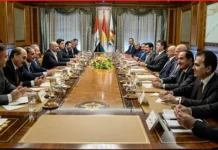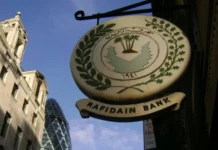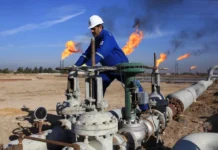“Due To Increased Oil Exports, SOMO” Reveals Millions Of Dollars In Revenue For Iraq.
Economy | 04:01 – 09/21/2025 Mawazine News – Baghdad – The State Oil Marketing Organization (SOMO) announced on Sunday that increasing Iraq’s exports after ending the voluntary cut to 200,000 barrels per day will generate millions of dollars in revenue.
The company’s general manager, Ali Nizar Al-Shatri, said in a statement to the official agency, followed by Mawazine News, that “Iraq has achieved an increase in its oil exports after the gradual end of the voluntary cut by the OPEC and non-OPEC countries.”
He explained that “Iraq was able to increase its oil production, which enabled it to raise the volume of its exports, based on a study of the oil market balance by OPEC and non-OPEC experts, who approved the possibility of this increase.”
He added, “Oil exports are the main source of financing the general budget, and with current prices ranging between $65-68 per barrel, at an annual average of nearly $70, an increase of approximately 200,000 barrels per day, equivalent to 6 million barrels per month, will contribute to achieving hundreds of millions of dollars in additional revenues that can be invested to support budget requirements.”
He pointed out that “the Oil Marketing Company is working, through commercial agreements and profit-sharing projects with foreign companies, to achieve greater revenues from selling conventional oil through ports.
This is achieved by reselling a portion of the barrels in global markets when commercial opportunities arise or demand from certain companies arises, which provides additional profits above the official price.”
He noted that “the company has also activated the mechanism for selling spot shipments, which has enabled the sale of a number of barrels at price premiums commensurate with the volume of demand and available opportunities in the global oil market.” https://www.mawazin.net/Details.aspx?jimare=267160
Iraqi Oil Revenues Rise After Voluntary Cut Ends
energy The State Oil Marketing Organization (SOMO) announced on Sunday that it achieved an increase in its revenues after ending the voluntary reduction.
The company’s general manager, Ali Nizar Al-Shatri, said, “Iraq has seen an increase in its oil exports after the voluntary cuts by OPEC and allied countries gradually ended.”
He explained that “Iraq has been able to increase its oil production, which has enabled it to raise the volume of its exports, based on a study of the oil market balance by OPEC and non-OPEC experts, who approved the possibility of making this increase.”
He added, “Oil exports are the main source of funding for the general budget, with current prices ranging between $65 and $68 per barrel, and an annual average of approximately $70,” adding, “With an increase in production estimated at approximately 200,000 barrels per day – equivalent to approximately 6,000,000 barrels per month – this will contribute to additional revenues estimated at hundreds of millions of dollars annually, as additional revenues that can be invested to support budget requirements.”
He pointed out that “the Oil Marketing Company is working, through commercial agreements and profit-sharing projects with foreign companies, to generate greater revenues from the sale of conventional oil through ports.
This is achieved by reselling a portion of the barrels on global markets when commercial opportunities arise or when certain companies demand it, thus generating additional profits above the official price.”
He pointed out that “the company also activated a mechanism for selling spot shipments, which enabled the sale of a number of barrels at price premiums commensurate with the volume of demand and opportunities available in the global oil market.” https://economy-news.net/content.php?id=60228
Central Bank And Monetary Policy Indicators For The First Half Of 2025
Samir Al-Nusairi The Central Bank’s monetary policy objectives are to achieve growth and economic stability, amidst the extremely complex economic, security, and political conditions facing the world, impacting our country both positively and negatively.
Our economy has suffered from these conditions for decades, due to the rentier nature of the economy and the fact that 93% of the general budget allocations are based on oil revenues, which constitute approximately 60% of the gross domestic product.
Meanwhile, the active productive economic sectors, namely agriculture, contribute 3% of the GDP, while industry does not exceed 2%, according to official data.
These are indicators that confirm the need to support, activate, and revolutionize the real sector to contribute to sustainable development, address shortcomings in local production, and address the failure of local producers to meet citizens’ consumption needs for food and other basic commodities.
Therefore, the private commercial sector relied almost entirely on imports, and domestic trade was neither controlled nor regulated. Control over illegal trade and informal border crossings was weak, and the inflation rate was the most prominent challenge facing monetary policy, directly impacting exchange rate stability.
The inflation rate in January 2023 was around 7.5%, prompting the Central Bank to take numerous measures, in cooperation with the government, to regulate foreign trade financing, control foreign transfers, ensure regularity in the global financial and banking system, comply with international standards, and move away from the electronic platform.
And the implementation of its third strategy and the regular implementation of the comprehensive banking reform project.
By analyzing the monetary policy indicators for the first half of 2025, we note the building of foreign reserves of approximately $100 billion, and the gold reserves of the Central Bank recorded a significant growth rate of (55%), as their value reached (22) trillion dinars during the same period, compared to their value of (14.7) trillion dinars in the second quarter of 2024.
The decline in the issued currency contributed to a decrease in the inflation rate, which maintains the stability of the general price level, as the currency issued by the Central Bank recorded a decrease in the rate of (3.8%), as it reached (98.4) trillion dinars during the same period, compared to its value of (102.3) trillion dinars in the second quarter of 2024.
The decline in the inflation rate also indicates a decline in the general price level, as inflation recorded a low rate of (76%), reaching (0.8%) compared to the second quarter of 2024, which reached (3.3%). This confirms that the Central Bank was able to build basic pillars for monetary stability and achieve the most important objectives of monetary policy. https://economy-news.net/content.php?id=60221
Gold Prices Fall In Baghdad
Stock Exchange Economy News – Baghdad Prices of both foreign and Iraqi gold fell slightly in local markets in the capital, Baghdad, on Sunday.
Gold prices in Baghdad’s wholesale markets on al-Nahr Street this morning recorded a selling price of 735,000 dinars per mithqal of 21-karat Gulf, Turkish, and European gold, and a purchase price of 731,000 dinars, compared to last Saturday’s price of 738,000 dinars.
The selling price of one mithqal of 21-karat Iraqi gold reached 705,000 dinars, and the buying price was 701,000 dinars.
As for goldsmiths, the selling price of a mithqal of 21-karat Gulf gold ranges between 735,000 and 745,000 dinars, while the selling price of a mithqal of Iraqi gold ranges between 705,000 and 715,000 dinars. https://economy-news.net/content.php?id=60225
The Dollar Exchange Rate Has Fallen Again In Baghdad.
economy | 11:17 – 09/21/2025 Mawazine News – Baghdad – The exchange rate of the US dollar against the Iraqi dinar witnessed a significant decline in local markets in Baghdad on Sunday.
The selling price reached 143,000 dinars for $100, while the buying price reached 141,000 dinars for $100. https://www.mawazin.net/Details.aspx?jimare=267138
For current and reliable Iraqi news please visit: https://www.bondladyscorner.com






